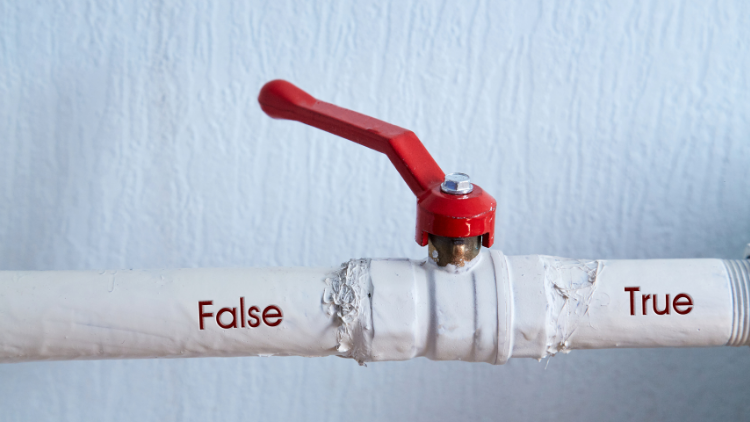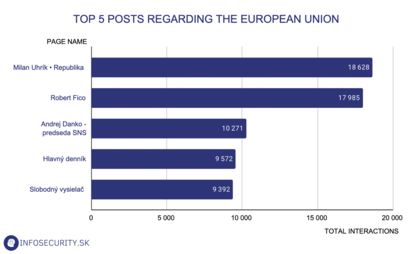DISINFORMATION
Pro-Russian disinformation actors target the European Union, including claims of fascism in Brussels

Infosecurity.sk presents an overview of disinformation trends that have been on the rise in information space in the past two weeks:
- The European Union has become the most prevalent target of pro-Russian disinformers. Disinformation actors are trying to discourage the EU from further supporting Ukraine in the war with Russia.
- The EU, for example, is accused of being solely responsible for its economic problems and of using Putin as a bogeyman to cover up its own incompetence.
- Propagandists also spread fabricated lies about European leaders to create distrust towards them. They claim that several leaders are descendants of German Nazis, even though it is not true.
- Various actors use Hungary as a symbol of resistance to the EU and its policies, adopting false narratives, such as that Brussels is only trying to punish Hungary because of its conservative government.
Targeting the European Union
The latest development in Ukraine has shown that Ukrainians are determined to keep fighting, and the West is not planning to stop supporting them diplomatically, financially, and militarily. Meanwhile, we can observe increased attacks on the EU in the statements of pro-Russian actors and on social media as well.
Actors such as Slovak MEP Milan Uhrík are trying to discourage financial support for Ukraine. At the same time, Uhrík is suggesting in his speech in the European Parliament that the EU's aid to Ukraine serves other interests and is being plundered by the Ukrainian oligarchs.
Milan Uhrík, who is also the head of the far-right Republika party, argues that the EU is using Putin as a bogeyman to cover up their own stupidity and incompetence. He blames the bad economic situation across European states on "nonsense Covid measures, illogical 'Green Deals,' but above all on fools and amateurs in the political leadership."
Similar false narratives are being promoted by MP Ľuboš Blaha, deputy chair of the Smer-SD party. In a recent post, he targets, among others, the European Union, which he blames "for all the misery in Slovakia regarding prices" and claims that the EU, together with the US, want to destroy Russia. At the same time, he defends Hungary, claiming that "what they are doing to Hungary in Brussels is pure fascism. Any other opinion is forbidden. They want to starve us all in the EU and send us like sheep to the slaughter. Welcome to 1933."
In addition to the EU, Ľuboš Blaha also attacks the Slovak government and Slovak president, conspiring that George Soros controls them, they act based on "New York instructions," and they are "liberal fascists." Blaha is spreading conspiracies about President Zuzana Čaputová, although a district court in Bratislava recently ordered him to stop spreading the allegation that the president is a foreign agent. The court stated that his accusations have no factual basis and are defamatory, where an attempt to provoke strong negative emotions among his supporters towards the president is evident.
The conspiracy website Slobodný vysielač is regularly publishing original posts and videos of Ľuboš Blaha on Facebook, bypassing Meta's banning of Blaha on Facebook.
Typical disinformation narratives are also spread by the former speaker of the Slovak parliament. Andrej Danko, the leader of the Slovak National Party, has long promoted pro-Russian views and has based his political activities on contacts with Russian officials. He claims that the war in Ukraine is convenient for Brussels because they are making money out of it. Danko also conspires that the European Union is deliberately raising the price of "cheap Russian gas" to match "really expensive Western liquefied gas."
Efforts to discredit European leaders
One of the easiest ways for propaganda to succeed is to discredit its opponents. Pro-Russian actors also try to build distrust toward the European Union by spreading disinformation about its leaders.
Since the beginning of the war in Ukraine, the former head of the Supreme Court of the Slovak Republic and unsuccessful presidential candidate Štefan Harabin has been adopting Kremlin narratives and spreading disinformation and hoaxes about the conflict. These include, for example, the claim that Hitler's descendants have risen to positions of power in Europe and are now seeking revenge against Russia.
It is a frequent phenomenon to label European leaders as descendants of the German Nazis. The President of the European Commission, Ursula von der Leyen, is being falsely described by disinformation actors as the granddaughter of a Nazi who was involved in organizing the Holocaust. Polish President Andrzej Duda, the Executive Chairman of the World Economic Forum Klaus Schwab, as well as German Chancellor Olaf Scholz, and former President of the European Council Donald Tusk, have faced similar disinformation. In all cases, however, these are fabricated lies intended to hurt their credibility.
Ursula von der Leyen, as the most visible figure in the European Union, is perhaps the most frequent target of attacks. Attacks on her personality or disinformation about her personal life are part of the anti-campaign. The disinformation website Infovojna recently called her a “führer” and accused her of spreading “Ukronazi propaganda.” German Chancellor Olaf Scholz was also recently branded a "führer" in the same media outlet.
Hungary as a symbol of resistance to the European Union
The current legal fight between the Hungarian government and the European institutions has not left even pro-Russian disinformers in Slovakia cold. These include politicians such as the previously mentioned Ľuboš Blaha, who accuses Brussels of fascism against Hungary, but also MEP Miroslav Radačovský, who got into the European Parliament on the ticket of the Kotleba-ĽSNS party (far-right political party). Radačovský argues that Hungary simply does not listen to Brussels politicians, so they want to deal with them.
In addition to politicians, various disinformation media also play an important role. They are uncritically adopting the statements of Hungarian leaders, sharing overly positive news about the Hungarian government, and selectively choosing one-sided information.
Orbán's Hungary is mostly portrayed by various actors as a victim of persecution by the EU but also as a role-model for domestic politics and inspiration for opposing the policies of the European Union. The dispute between Budapest and Brussels, which is essentially about the violation of the rule of law in Hungary, is presented as an ideological struggle between "progressives in the Brussels institutions" and the "patriotic-conservative government" in Hungary.
False narratives are spread by politicians, but also by disinformation media
As the European Union seems to be the most prevalent topic of disinformation narrative in Slovakia in recent weeks, we decided to look at the issue through the CrowdTangle analysis tool. The chart below shows the most popular Facebook posts on the Slovak disinformation scene in the last two weeks. Posts were evaluated based on the total number of interactions (the sum of all reactions, comments, and shares). In the analysis, we filtered only the posts containing the keyword EÚ.

MEP Milan Uhrík published the most popular post on the topic in the last two weeks. He shared a speech by Austrian MEP Harald Vilimsky, who accused the EU leadership of deliberately damaging the Union, first through "corona rampages" and then through "senseless and crazy sanctions."
In a Facebook post, former Prime Minister Robert Fico claims that the European Union is silencing and punishing Hungary for having a different opinion on the Russian Federation. Fico speaks of "a dangerous fascization" of the EU.
Andrej Danko, the head of the Slovak National Party, declares that we are German slaves. In his words, the Germans are making money from everything in the EU, and they will allegedly sell us Russian gas for huge amounts of euros.
The disinformation media Hlavný denník and Slobodný vysielač shared articles with similar content. In the first, Hungarian Prime Minister Viktor Orbán claims that the collapse of the European Union is imminent. Second, they share Orbán's remarks that Hungary should reconsider its EU membership.
Project Infosecurity.sk organized by Adapt Institute, which is supported by the Prague office of the Friedrich Naumann Foundation for Freedom, continuously monitors the activities of both Slovak and foreign disinformation actors, but focuses mainly on the former. The project activities are built upon daily monitoring of emerging disinformation, hoaxes, and conspiracy theories in the online information space. This approach allows the analysts to identify disinformation posts and narratives that resonated with the public the most, as well as to find out where they originated, and how they spread and evolved on social media. The report takes the form of a bi-weekly summary of arising trends in the spread of malicious information content online. Based on that, Infosecurity.sk can warn the public about emerging and current trends in the field of disinformation, manipulation, and propaganda.

